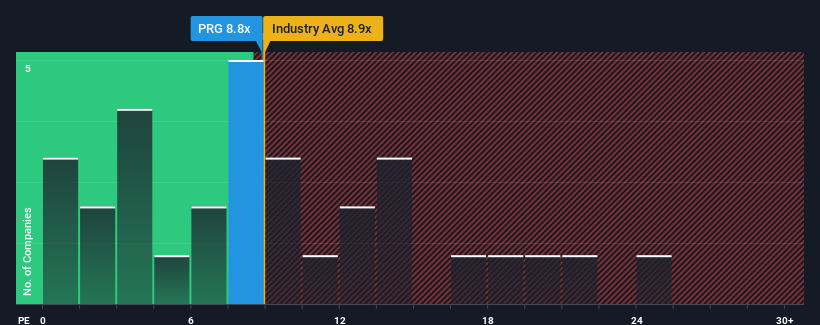- United States
- /
- Consumer Finance
- /
- NYSE:PRG
Investors Aren't Buying PROG Holdings, Inc.'s (NYSE:PRG) Earnings
PROG Holdings, Inc.'s (NYSE:PRG) price-to-earnings (or "P/E") ratio of 8.8x might make it look like a buy right now compared to the market in the United States, where around half of the companies have P/E ratios above 17x and even P/E's above 33x are quite common. Although, it's not wise to just take the P/E at face value as there may be an explanation why it's limited.
With its earnings growth in positive territory compared to the declining earnings of most other companies, PROG Holdings has been doing quite well of late. One possibility is that the P/E is low because investors think the company's earnings are going to fall away like everyone else's soon. If not, then existing shareholders have reason to be quite optimistic about the future direction of the share price.
See our latest analysis for PROG Holdings

What Are Growth Metrics Telling Us About The Low P/E?
The only time you'd be truly comfortable seeing a P/E as low as PROG Holdings' is when the company's growth is on track to lag the market.
Retrospectively, the last year delivered an exceptional 83% gain to the company's bottom line. The strong recent performance means it was also able to grow EPS by 732% in total over the last three years. Accordingly, shareholders would have probably welcomed those medium-term rates of earnings growth.
Shifting to the future, estimates from the six analysts covering the company suggest earnings should grow by 0.5% each year over the next three years. Meanwhile, the rest of the market is forecast to expand by 13% per annum, which is noticeably more attractive.
With this information, we can see why PROG Holdings is trading at a P/E lower than the market. It seems most investors are expecting to see limited future growth and are only willing to pay a reduced amount for the stock.
The Final Word
Generally, our preference is to limit the use of the price-to-earnings ratio to establishing what the market thinks about the overall health of a company.
We've established that PROG Holdings maintains its low P/E on the weakness of its forecast growth being lower than the wider market, as expected. Right now shareholders are accepting the low P/E as they concede future earnings probably won't provide any pleasant surprises. It's hard to see the share price rising strongly in the near future under these circumstances.
Before you settle on your opinion, we've discovered 3 warning signs for PROG Holdings (1 is a bit unpleasant!) that you should be aware of.
You might be able to find a better investment than PROG Holdings. If you want a selection of possible candidates, check out this free list of interesting companies that trade on a low P/E (but have proven they can grow earnings).
New: Manage All Your Stock Portfolios in One Place
We've created the ultimate portfolio companion for stock investors, and it's free.
• Connect an unlimited number of Portfolios and see your total in one currency
• Be alerted to new Warning Signs or Risks via email or mobile
• Track the Fair Value of your stocks
Have feedback on this article? Concerned about the content? Get in touch with us directly. Alternatively, email editorial-team (at) simplywallst.com.
This article by Simply Wall St is general in nature. We provide commentary based on historical data and analyst forecasts only using an unbiased methodology and our articles are not intended to be financial advice. It does not constitute a recommendation to buy or sell any stock, and does not take account of your objectives, or your financial situation. We aim to bring you long-term focused analysis driven by fundamental data. Note that our analysis may not factor in the latest price-sensitive company announcements or qualitative material. Simply Wall St has no position in any stocks mentioned.
About NYSE:PRG
PROG Holdings
A financial technology holding company, provides payment options to consumers in the United States.
Very undervalued average dividend payer.
Similar Companies
Market Insights
Community Narratives



